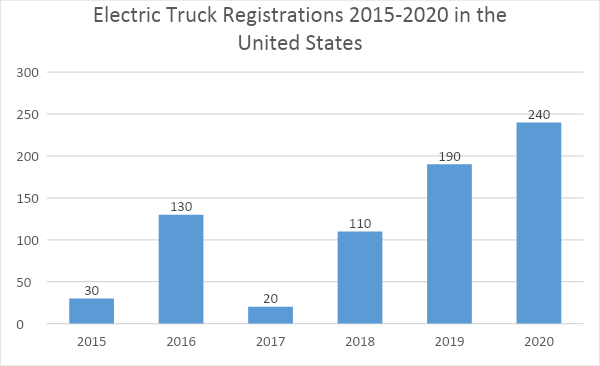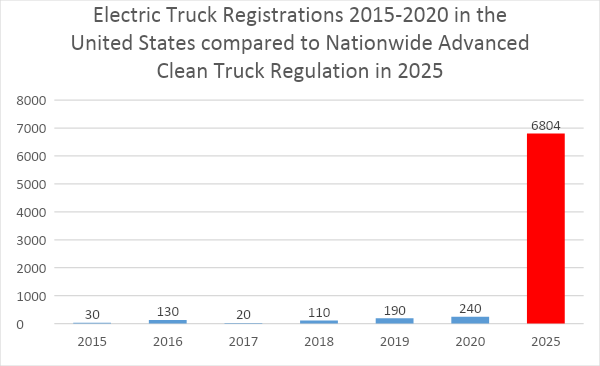Last week, IER filed comments on New Jersey’s proposed Advanced Clean Trucks Program. This regulation was first proposed by California and New Jersey is following suit. The regulation would require truck manufacturers to sell an increasing percentage of zero-carbon-dioxide-emitting trucks starting in 2025. As with many regulations like this, it makes sense to bureaucrats sitting in offices, but not to the men and women who depend on trucks to do their work every day.
This Rule Would Regulate Most Classes of Trucks
This regulation would require manufacturers to sell a percentage of zero-carbon-dioxide-emitting trucks for all of the trucks from Class 2b to Class 8. This means all trucks manufacturers sell larger than the Ford F-150, i.e., from the Ford F-250, F-350, Chevy Silverado 2500, Silverado 3500, Dodge Ram 2500, and Ram 3500 all the way to semi-trucks, would be regulated under the rule.
The challenge here is that there are not zero-carbon-dioxide-emitting versions of many of these truck classes and very few sales for ones that are available. These are all work trucks and it’s difficult to build electric work trucks that will accomplish their missions. One example of the challenge is illustrated by Ford.
With much fanfare, Ford recently announced its electric F-150. There is definitely much excitement within Ford and elsewhere about the potential for Ford’s electric truck. Ford is also making significant investments in electrification. Ford recently announced they will be spending $30 billion by 2025 on battery R&D. However, just last November, Ford also announced they were pulling the plug on an electric F-250 and F-350—the trucks that would be regulated by this New Jersey’s proposed rule. In other words, Ford has announced an electric F-150 and will be selling the vehicle next year, but at the same time, they are pulling back on heavier-duty electric work trucks.
Electrifying Trucking is Hard
Ford announcing an electric F-150 while pulling back on electric F-250 and F-350 shows that it’s hard to electrify these heavier-duty trucks. Another instructive example is Tesla. Tesla is arguably the most successful electric vehicle company in the world, however, as of January 30, 2021, Tesla had never turned a profit selling cars. Tesla may have valuable stock, but the business of making a profit selling electric vehicles is difficult.
Not only has Tesla never turned a profit selling cars, they have announced, but never produced trucks. In 2017, Tesla announced an electric semi, but has yet to produce any in the intervening three and a half years. In 2019, Tesla announced the Tesla Cybertruck. This appears to be a light-duty truck, but similar to the semi, Tesla has not produced any Cybertrucks so far.
Another company struggling to produce electric trucks is Lordstown Motors. Lordstown recently announced they were a going concern risk after a $125 million first-quarter loss.
More established medium- and heavy-duty truck companies are working on rolling out their electric trucks, but have yet to deliver many electric medium- and heavy-duty trucks. Peterbilt has announced, the medium-duty 220EV, the drayage and regional haul 579EV, and the 520EV refuse hauler and Kenworth has announced electric versions of its K270 Class 6 and K370E Class 7 trucks. These trucks are rolling out slowly with Peterbilt delivering their first 220EV last week and it’s not clear that Kenworth has delivered any of their electric trucks yet.
There is demand for electric versions of some trucks because there are likely some use cases where electric trucking makes sense, such as short-haul or delivery trucks where a truck will not travel too far every day and can return home to a base where it can recharge. But as Tesla, Ford, Lordstown, and more companies moving into electric trucking shows, electrifying trucking is difficult.
There Are Some Electric Truck Sales, but Not Nearly Enough to Comply with the Regulation
One of the most obvious problems with requiring companies to sell a certain percentage of electric vehicles is that electric versions of many truck types do not yet exist or they do not exist in anywhere near the number needed to comply with the regulation.
To understand the challenge New Jersey has proposed to impose on truck manufacturers, New Jersey will require approximately 2.8 percent of Class 7 and 8 trucks sales to be electric or fuel cell by 2025. The reality is more complicated than that because there is a complex credit/deficit system and different truck classes get different credits. But we believe 2.8 percent of heavy-duty trucks is a good estimate given the information New Jersey has proposed. (More on this in IER’s comment.)
The following chart shows data from the International Energy Agency in heavy-duty electric truck registrations. In recent years, the registrations of electric heavy-duty trucks have increased.

An average of 60 electric trucks were registered in the United States in 2015, 2016, and 2017. From these years to 2020, electric truck registrations quadrupled. This was an impressive increase. However, this dramatic increase is not nearly fast enough to comply with New Jersey’s regulation starting in 2025 to require large numbers of purchases of Class 7 and 8 electric trucks.
In the United States in 2020, there were 243,000 Class 7 and 8 trucks were sold. This means that if every state were to implement the zero emission truck rule New Jersey and California are planning on, then about 2.8 percent of 243,000 trucks would need to be sold nationwide. This is 6,804 trucks. While 6,800 trucks may not seem like a massive number, it 28 times more than the 240 electric heavy-duty trucks sold today. Given electric truck sales history, this is an implausible increase.

Conclusion
Electrification is changing transportation. But it currently isn’t clear how electrification will work with trucking. Instead of mandating electric vehicles, people should be free to choose which vehicles work best for themselves and their businesses. Mandating electric trucks, for example, will almost certainly drive up prices for all truck users because there currently are not enough trucks or announced trucks to meet the mandates. New Jersey and other states would be better off with a non-regulatory approach as companies and purchasers figure out where electric trucks makes sense and where they do not.



